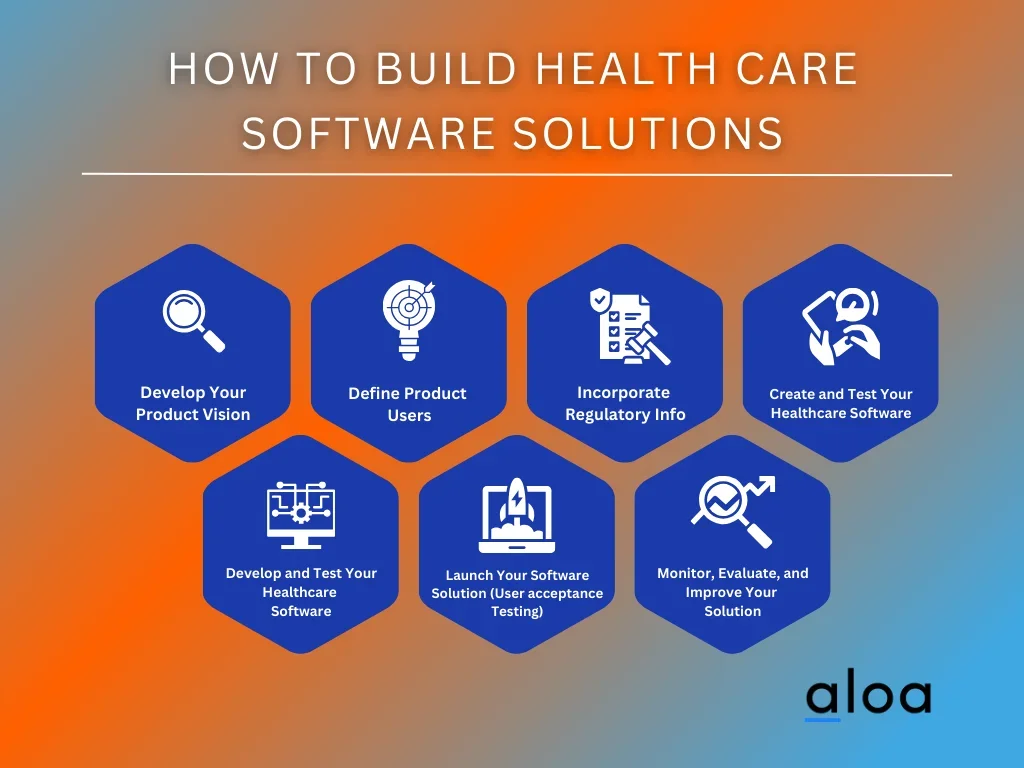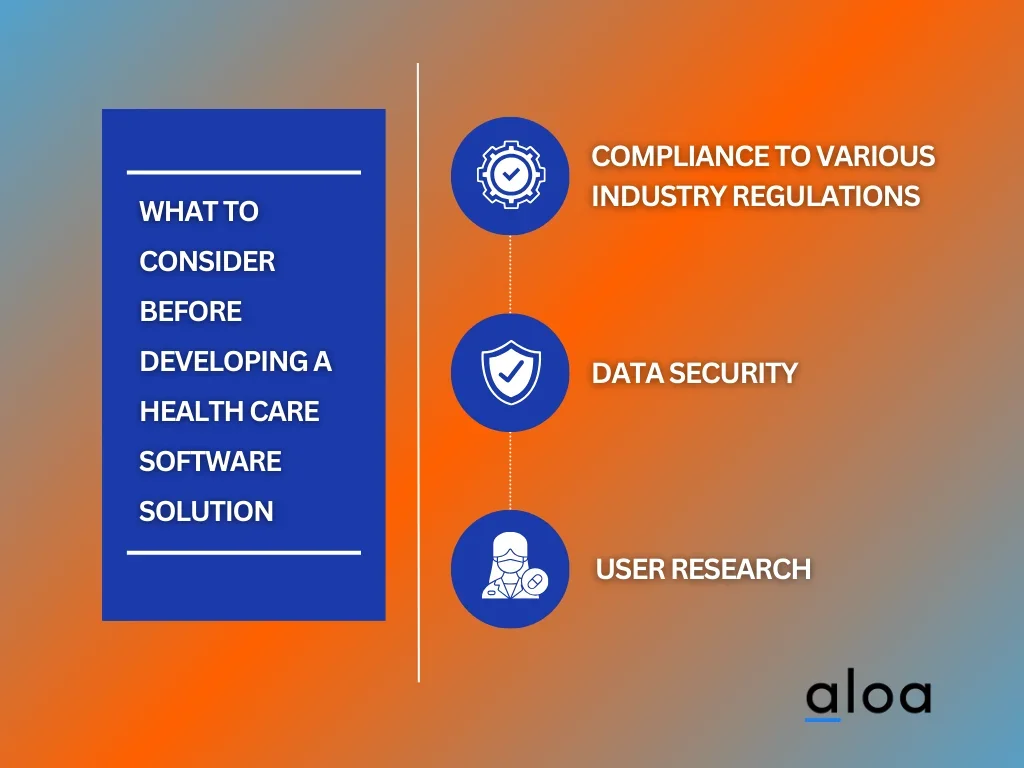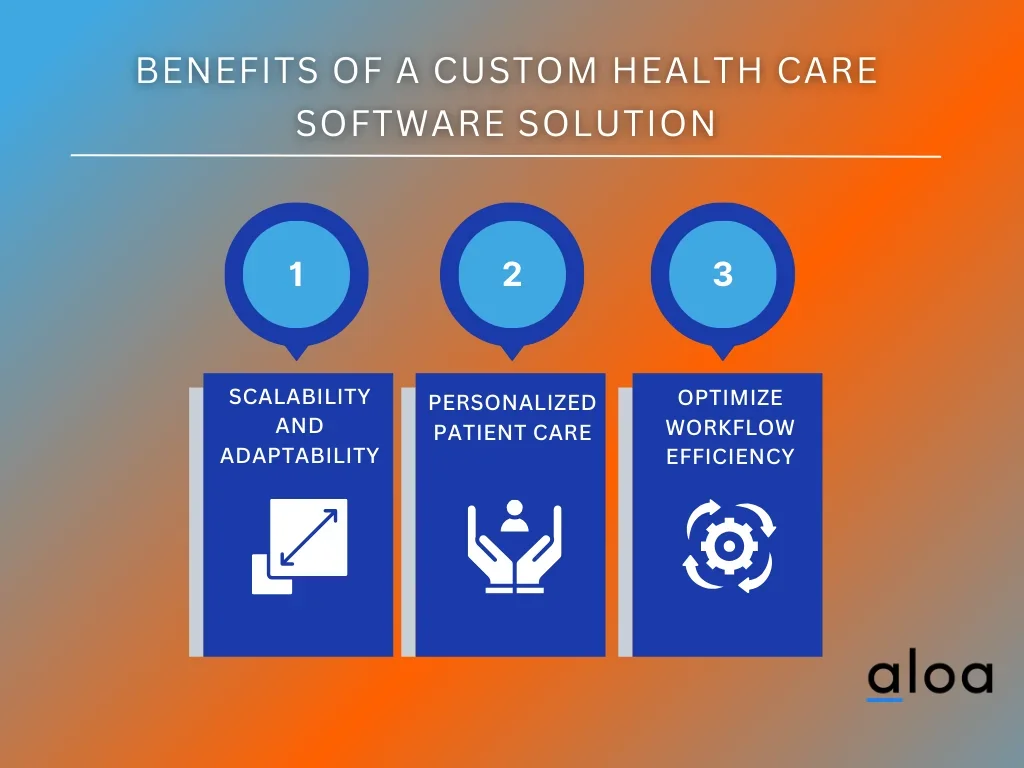Health care software solutions are an integral system in allowing users easier access to aid using various programs. Companies that want to develop a well-designed software system should take the opportunity to understand the fundamentals of what makes health care a complex system to develop. Hiring developers who can help plan your software can prove beneficial in the long run.
We at Aloa empower our clients to get matched with the right software developers who can help develop their system needs. Our expertise in providing health care software solutions extends to various products and wellness programs in general healthcare, such as Pepcare, all consisting of understanding the healthtech industry as a whole. Finding the right niche that can help sustain the growth of your health care system is part of our services.
In this blog post, we will be talking about the fundamentals of building top-notch health care software solutions. We shall also discuss the various trends in the health care industry to keep track of further improving the usability and experience of your audience through medical data and patient engagement.
Let's begin.
How To Build Health Care Software Solutions
The Healthtech industry requires deep understanding on the interplay between technology and healthcare. Developing effective health care software solutions involves careful planning, research, and collaboration with industry experts.
Here are the key steps to follow when building healthcare software solutions:

Step 1: Develop Your Product Vision
The first step in developing reliable health care software solutions is to determine your product's overall vision. Companies that are seeking to create an entire system for their users to operate can first understand the main product vision for their health care software solutions.
Outlining a product vision answers critical questions that can help strategize the most optimal plans to develop your health care system. Some of the most common questions include asking for the software's main purpose, figuring out who the target audience is, and what makes your healthtech product better in the competitive market.
This opportunity is also a great time to distinguish your medical software solutions and what contributions they can provide to the healthcare sector. From accurate diagnoses with lab results to better remote patient management, finding your product vision helps developers focus on key targets you want your audience to understand about your company.
Step 2: Define Product Users
Every health care software solution has different fundamental uses depending on who the program is made for initially. Some programs can aid both the end user and the employees in an eHealth organization simultaneously, making defining the product users much more essential.
Take into consideration the benefits of each user of your system to get a better understanding of its main advantages.
- Doctors: Allow easy access to patient records or create requests to different departments for sample testing.
- Nurses: Allow each nurse to easily track and monitor the health and well-being of various patients under their care for faster response times.
- Patients: Set appointments or keep a record of any prescriptions required by their doctors or medical practitioners under one platform.
- Pharmacists: Instantly get a background check and confirmation of different prescribed medications while also simplifying inventory monitoring.
- Sponsors: Manage the overall finances of the healthcare industry and ensure that all spending is accounted for and managed by the correct administrators.
Producers can also extend not only to medical professionals but also to different components of the healthcare industry. Companies looking to hire a software developer that could help them craft comprehensive healthcare software solutions should also consider the scalability and the number of end users that would form after a period of growth.
Step 3: Include Regulatory Requirements and Details
Regulating software for the health tech industry allows companies and users to have a more accessible opportunity to establish regulatory requirements and intricate details that could help track and manage critical information. Establishing proper HIPAA compliance as a vital requirement to ensure a streamlined approach to the overall health care software solutions prevents issues in the long run.
It's essential that you communicate with your software developers to ensure that they meet all of the company standards and that each process is carefully managed through all components. These are examples of some the most important regulatory requirements to be discussed with your chosen developers:
- Timeline: Discuss the hard timeline required for each feature and function of your healthcare software solutions to ensure that there would be no delays in production.
- Budget: Rigorous budget checking can also allow for better opportunities to discuss software's potential growth and scalability. Take the opportunity to discuss any potential way for financial gain or budgetary space for any future developments.
- Team Size: Although hiring as many software developers as possible might seem to be a good option to speed up the production of your health care software solutions, it's also crucial to discuss the overall team size to prevent bloating and high overhead costs.
- Type of Solution: Different health tech systems would offer different types of benefits to its overall customer base. It's important to know what kind of solution your health care industry will focus on. Choosing to develop different platforms all at once can cause significant problems when managing and budgeting each project.
Regulation compliance is also a critical component in every health care industry as it ensures both the users and the company that the system carefully follows the laws required by the government. Always ensure that your system keeps a close watch on managing and following all mandatory regulations to prevent potential risks in the future.
Step 4: Hire a Health Care Software Development Team
Healthcare developers are integral in keeping the safety and well-being of different users from around the world consistent and reliable in the overall health care environment. Hiring a healthcare software development team allows companies to establish a dedicated group of developers that can help manage and create a system in which healthtech can evolve beneficially.
Consider these criteria as a platform to determine what are the good qualities to look for in a healthcare development team:
- Streamlining workflow for all medical personnel.
- Enhancing patient care management.
- Ability to distinguish inefficiencies in the current healthcare system.
- Integrating current trends such as wearables and artificial intelligence in various health care software solutions.
Our team at Aloa has an extensive history with the healthtech industry and the nuances of choosing the right software development team to create this system. We have experience dealing with various healthcare software solutions, from Pepcare to general health development. Hence, our range extends beyond typical healthtech systems.
Step 5: Design, Develop, and Test Your Health Care Software Solution
Once you have hired your chosen software developers to work on your health care platform, it's essential to break down the different processes involved in ensuring that your healthcare software solutions meet company goals and standards.
Designing your healthcare software solution entails managing the right features and tools needed to allow each user to seamlessly utilize the platform to boost efficiency. Each element and function should directly contribute to the accessibility and usability of the software itself. Consider an improved user experience and interface to help people utilize the program more efficiently.
After the design phase, develop your healthcare software solutions to ensure that each component functions well. The overall experience of how the software solution would operate depends solely on the quality and knowledge of your developers. Their ability to understand and utilize different programming languages and tech stacks can significantly affect the final product.
Finally once your healthcare system is developed, it's time to start testing for bugs and other potential security risks. It's essential to have a dedicated team monitoring and managing both the performance and experience of the software itself. Before officially launching your software, any bugs should be addressed to ensure users are encouraged to use your platform.
Step 6: Launch Your Software Solution (User acceptance Testing)
It's ideal for most software to have a basic launch before fully utilizing and integrating various advanced tools and features to prevent users from suffering through critical bugs or errors. This user acceptance testing is an essential component to securing their trust in using your software as a whole, especially in the health care industry.
Slowly build your program through the comments and suggestions of your user base. The information they provide can help distinguish possible routes to help scale the platform more without the risk of overspending on budget and various functionalities that would provide little to no merit to the healthcare industry.
Step 7: Monitor, Evaluate, and Improve Your Solution
Overtime new technologies would start to sprout in other technological advancements that would cause your system to feel obsolete. Hiring a software development team that understands the need to modernize a system is an excellent step to ensuring that your software remains viable and potentially future-proof your healthcare software solution as a whole.
Software developers that have the capacity to adapt through the results of its monitoring are essential to keeping your health care software solutions up to date to the standards set by your user base. In healthcare solutions, it's critical that you track the performance of medical billing, appointment scheduling, treatment process, and quality of patient care to ensure that their recovery is consistent and stable.
Companies that built their health care system as custom software can use this opportunity to create easier openings to integrate new technological improvements in their platform without diving deeper into the current system.
What To Consider Before Developing a Health Care Software Solution

Developing a health care software solution requires careful planning and precision to ensure that it functions as intended. Careful considerations in various health and wellness components allow companies to formulate a better system in place.
Compliance with Various Industry Regulations
The healthcare industry contains a high number of regulations and compliances that need to be met. Talking with a software development company that understands the various local and international requirements and rules for a health care software system to be made is a critical component of healthtech.
Data Security
Both doctor and patient records are strictly confidential. Health care companies should always strive to secure their system with the best data protection tools and services that their developers can create. Additional security features like automatic log-off or instant notifications help create a safer platform for all users to enjoy.
User Research
Always consider the overall user experience and its benefits for your target audience. By understanding their needs, developers would have an easier time implementing various features such as better management of patient information which can help enhance the functionality of your health care software solutions.
Services Offered
Medical services are only as reliable if patients can fully trust the organization to accept their offers. Various development solutions can provide a boost to different types of healthcare software. Understanding what makes your organization's medical software stand out can allow for better control over implementation such as with telemedicine software for virtual consultations or remote monitoring.
Benefits of a Custom Health Care Software Solution

With healthtech constantly evolving, more and more users are utilizing various devices to help improve their health and wellness. Building a custom health care software solution aimed at aiding your clients' specific needs can help your business grow into a more accessible platform.
Here are some of the benefits of building a custom health care software solution:
Personalized Patient Care
One of the most significant advantages of custom health care software is the ability to provide personalized patient care. These solutions make capturing and analyzing patient data faster and easier. This system helps enable healthcare providers to create personalized treatment plans based on individual health records, preferences, and medical history.
Better management of a patient's health records also builds a stronger trust between patient and doctor. Health care software solutions also enable hospitals and pharmacies to have better control over medication management for patients under their care.
Scalability and Adaptability
Custom software solutions are easier to build with scalability in mind, allowing them to grow and adapt to changing requirements without needing significant overhauls. Regardless if your system accommodates an increase in patient volume, expands services, or integrates new technologies, custom health care software provides the flexibility needed to scale operations effectively.
Companies looking to enhance their options for revenue cycle management can easily integrate additional services such as telemedicine or an electronic health record system, to improve their maximum reach and potential between clients. These digital solutions offer the healthcare software market a better means to empower their financial operations.
Enhanced Efficiency and Workflow Optimization
Customizing your health care software solutions from the ground up allows you to seamlessly optimize the efficiency and workflow of your organization to align with what your personnel needs. From patient scheduling to billing and electronic health records (EHR) management, a custom solution ensures that every facet of healthcare delivery is optimized.
Better health care software solutions also open more opportunities for businesses to expand their efficiency outside the typical medical staff priorities, such as patient satisfaction and clinical data retrieval. Improving digital healthtech can also allow better communication and collaboration between different departments to ensure components like inventory management are controlled and monitored.
Key Takeaway
Health care software solutions play a pivotal role in modernizing and enhancing healthtech services and functionality. By utilizing research on your customer base and their needs, the process of developing the software becomes easier to manage. Developing the right health care software solutions for your company allows your business to be more accessible to a broader audience.
If you want to learn more about building reliable and scalable health care software solutions, contact us at [email protected] to learn more.

